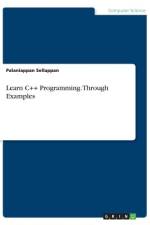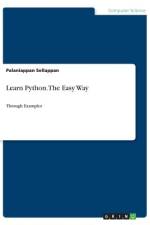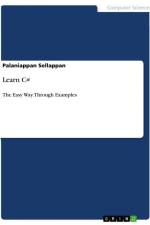von Palaniappan Sellappan
19,99 €
Document from the year 2018 in the subject Computer Science - Programming, , course: Information Technology, language: English, abstract: Python, developed by Guido van Rossum of Netherlands in the late 80s, and named after the BBC TV show Monty Python's Flying Circus, is one of the most user-friendly and powerful general-purpose computer programming languages available today. Its English-like syntax makes it a great language for teaching and learning computer programming. Python's powerful data structures/types such as lists, tuples, dictionaries, sets, and arrays make coding simple. It also comes with an extensive collection of built-in/library functions that allows users to develop software applications with relative ease. Besides, users can freely import external modules to help them develop all sorts of applications. Python's interactive and interpreted mode makes coding and testing software easy. Python also doubles us as a powerful and sophisticated calculator. You can use Python to develop all sorts of applications ranging from simple Mathematical and Text processing to Database, Web, Graphical User Interface, Network, Games, Data Mining, Artificial Intelligence, Machine Learning and Deep Learning. This book is intended for beginners who have little or no knowledge of programming. It is also suitable for intermediate programmers who already have some knowledge of programming. This text is suitable for secondary school, college and university students irrespective of their field of study - be it Arts, Business, Science, Engineering, Life Sciences or Medicine. It starts with the basics, but progresses rapidly to the advanced topics such as lists, tuples, dictionaries, arrays, functions, classes, files and databases. So whether you are a beginner or an intermediate programmer, this book will help you master the essentials of Python programming very quickly. The book is written in a simple, easy-to-read style and contains numerous examples to illustrate the programming concepts presented. It also contains exercises to test the reader's grasp of the material presented in each chapter.



